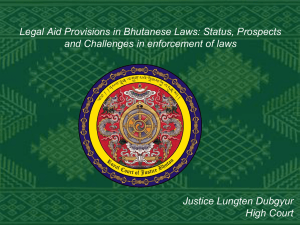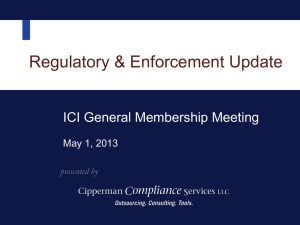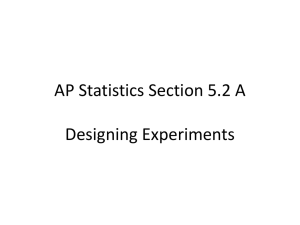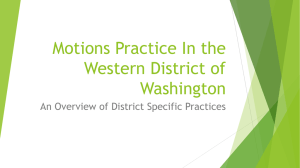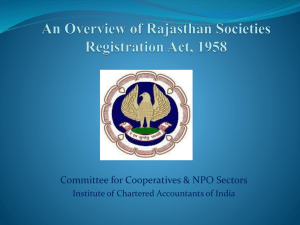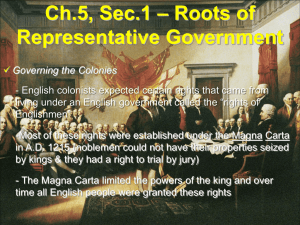Executive.Magistrate.by.Kunal.IAS.on.4.July.2014
advertisement
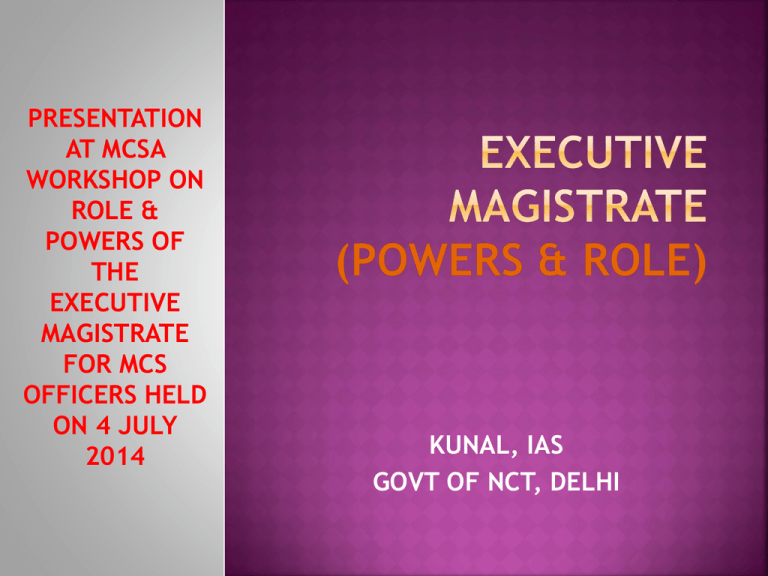
PRESENTATION AT MCSA WORKSHOP ON ROLE & POWERS OF THE EXECUTIVE MAGISTRATE FOR MCS OFFICERS HELD ON 4 JULY 2014 KUNAL, IAS GOVT OF NCT, DELHI Sec 6 of CrPC :Besides the High Courts and the Courts constituted under any law, other than this Code, there shall be, in every State, the following classes of Criminal Courts, namely:(i) Courts of Session; (ii) Judicial Magistrates of the first class and, in any metropolitan area, Metropolitan Magistrates; (iii) Judicial Magistrates of the second class; and (iv) Executive Magistrates. By virtue of Sec 397,398 all criminal courts are inferior to Sessions Court. Most important as the legal meaning of the words are different than casual/dictionary meaning Sec 3(4) Where, under any law, other than this code, the functions exercisable by a magistrate relate to mattersa) which involve the appreciation or shifting of evidence or the formulation of any decision which exposes any person to any punishment or penalty or detention in custody pending investigation, inquiry or trial or would have the effect of sending him for trial before any court, they shall, subject to the provisions of this code, be exercisable by a Judicial Magistrate; or b) which are administrative or executive in nature, such as, granting of a licence, the suspension or cancellation of a licence, sanctioning a prosecution or withdrawing from a prosecution, they shall, subject as aforesaid, be exercisable by an executive Magistrate. A Civil Service Officer when posted in districts wear different hats: District Magistrate/ADM/SDM/EM Collector/Assistant Collector (Revenue Officer) District Election Officer/ERO/RO/AERO/ARO District Program Coordinator/DPO/ADPO/PO Chairman/Member of various bodies/committees Can all the functions termed as Criminal Court? No Instances have been noticed that appeal against other court functions have been filed with Sessions Court. Only Criminal court cases can be appealed in Sessions Court. e.g. quashing of u/s144 CrPC by Civil Judge in Saiha State Govt can appoint as many persons it may deem fit as Executive Magistrate (EM) and shall appoint one of them to be District Magistrate (DM) One of the Executive Magistrate to be Addl District Magistrate (ADM) One EM in charge of sub division designated as Sub Divisional Magistrate (SDM) Hierarchy (Sec 23) DM SDM EM Sec 21:Appointment of Special Executive Magistrates Sec 22: Defining local areas of EM/SEM. In general jurisdiction of each EM extends throughout the district Sec 23: Subordination of EMs except ADM to DM in a District. Subordination of EM to SDM in a sub-division Sec24(4),(5): Appointment of Public Prosecutor by State from a panel prepared by DM in consultation with Sessions Judge “Police officers superior in rank to an officer in charge of a police station may exercise the same powers, throughout the local area to which they are appointed, as may be exercised by such officer within the limits of his station.” CrPC only talks about SI/SHO/IG. So by virtue of this section, the senior-most officer available on the spot may exercise the power of SHO Every person is bound to assist a Magistrate or police officer reasonably demanding his aida) in the taking or preventing the escape of any other person whom such magistrate or police officer is authorized to arrest; or b) in the prevention or suppression of a breach of the peace; or c) in the prevention of any injury attempted to be committed to any railway, canal, telegraph or public property. (1) Every officer employed in connection with the affairs of a village and every person residing in a village shall forthwith communicate to the nearest Magistrate or to the officer in charge of the nearest police station, whichever is nearer, any information which he may posses respecting :(a)-(e) relates to crime (f) any matter likely to affect the maintenance of order of the prevention of crime or the safety of person or property respecting which the District Magistrate by general or special order made with the previous sanction of the State Government, has directed him to communicate information. (2) (iii) the words “officer employed in connection with the affairs of the village” means a member of the panchayat of the village and includes the headman and every officer or other person appointed to perform any function connected with the administration of the village. Sec 41(1) deals with certain kinds of crime and cases Sec 41(2) Any officer in charge of a police station may, in like manner, arrest or cause to be arrested any person, belonging to one or more of the categories of person specified in section 109 or section 110 1) 2) When any offence is committed in the presence of a Magistrate, whether Executive or Judicial, within his local jurisdiction, he may himself arrest or order any person to arrest the offender, and may thereupon, subject to the provisions herein contained as to bail, commit the offender to custody. Any Magistrate, whether Executive or Judicial, may at any time arrest or direct the arrest, in his presence, within his local jurisdiction, of any person for whose arrest he is competent at the time and in the circumstances to issue a warrant. Wide powers to arrest. Police can arrest only for cognizable offence “Officers in charge of police stations shall report to the District Magistrate, or, if he so directs, to the Sub-divisional Magistrate, the cases of all persons arrested without warrant, within the limits of their respective stations, whether such persons have been admitted to bail or otherwise.” Important from human rights point of view and to ensure police should not misuse their wide powers A court may, in any case in which it is empowered by this Code to issue a summons for the appearance of any person, issue, after recording its reasons in writing, a warrant for his arresta) if either before the issue of summons, or after the issue of the same but before time fixed for his appearance, the court sees reason to believe that he has absconded or will not obey the summons; or b) if, at such time he fails to appear and the summons is proved to have been duly served in time to admit of his appearing in accordance therewith and no reasonable excuse is offered for such failure. An EM can issue Warrant under the abovementioned cases. In such cases all powers u/s 70,77,82,83 can be utilised by EMs. Sec 70: Issuance of Warrant and its force throughout India Sec 77: Execution of Warrant anywhere in India Sec 82: Proclamation of absconder Sec 83: Attachment of movable/immovable property of proclaimed absconder Sec 94: Power of DM/SDM to order search a place which he believes after inquiry that is used for deposit/sale of stolen properties, objectionable articles- counterfeit coins, currency, stamps, forged documents, false seals, obscene objects Sec 97: DM/SDM to order search if any person is reported to be confined. Sec 98: DM/SDM to restore liberty of woman in case of complaint of abduction/unlawful detention One of the core works of Executive Magistracy Preventive action to prevent any offence or mischief or breach of peace Sec 107: To prevent breach of peace. Execution of bond with or without surety from any person for such period not exceeding one year. Components of show cause: Receiving information Likelihood of a person to commit breach of peace Wrongful act which may lead to breach of peace Any EM may show cause for execution of a bond for good behaviour with or without surety if he has information that any person is (i) either orally or in writing or in any other manner intentionally disseminates or attempts to disseminate or abets the dissemination of- (a) any matter the publication of’ which is punishable under section 124A or section 153A or section 153B or section 295A of’ the Indian Penal Code (45 of’ 1860), or (b) any matter concerning a Judge acting or purporting to act in the discharge of his official duties which amounts to criminal intimidation or defamation under the Indian Penal Code (ii) makes Produces, Publishes or keeps for sale, imports, exports, conveys, sells, lets to hire, distributes, publicly exhibits or in any other manner puts into circulation any obscene matter such as is referred to in section 292 of the Indian Penal Code. When an Executive Magistrate receive information that there is within his local jurisdiction a person taking precautions to conceal his presence and that there is reason to believe that he is doing so with a view to committing a cognizable offence, the Magistrate may, in the manner hereinafter provided, require such person to show cause why he should not be ordered to execute a bond, with or without sureties, for his good behaviour for such period, not exceeding, one year, as the Magistrate thinks fit. When an Executive Magistrate receives information that there is within his local jurisdiction a person who(a) is by habit a robber, house-breaker, thief, or forger, or (b) is by habit a receiver of stolen property knowing the same to have been stolen, or (c) habitually protects or harbours thieves, or aids in the concealment of disposal of stolen property, or (d) habitually commits, or attempts to commit, or abets the Commission of, the offence of kidnapping, abduction, extortion, cheating or mischief, or any offence punishable under Chapter XII of the Indian Penal Code (45 of 1860), or under section 489A, section 489B, section 489C or section 489D of that Code, or (e) habitually commits, or attempts to commit, or abets the Commission of, offences, involving, a breach of the peace, or (f) habitually commits, or attempts to commit, or abets the commission of offences under certain Acts Procedures must be followed as per the Act Immense power wherein a person can be arrested either as preventive measure or in default of surety or in breach of bond (eg. Anna Hazare during 2012 movement) Magistrate has the jurisdiction to decide on type and class of surety and amount of bond Sec 129: Dispersal of unlawful assembly of 5 or more person by civil force which is likely to cause a disturbance to the public peace. Sec 130: Disbursal of such unlawful assembly by armed forces Sec 132: No prosecution against officers for acting u/s 129,130 without permission of State/Central Govt Sec 133: Magistrate’s power to order removal of public nuisance in 6 categories: Any unlawful obstruction or nuisance from public place or from any way, river channel etc which is lawfully used by public Conduct of any trade which is injurious to health Construction of building or disposal of any substance may result in conflagration or explosion Any building, tent or structure likely to fall Any tank, well or excavation likely to create danger Any dangerous animal which should be destroyed, confined or disposed off Sec 134-143 procedures for implementation of orders u/s 133 Sec 136: penalty u/s 188 of IPC for nonfollowing of final orders u/s 138 Sec 137: inquiry in denial of public right of way Sec 141: power of Magistrate to perform the directions issued u/s138 and recover the cost Sec 142: pending trial, Magistrate can issue injunction Sec 143: EM may order any person not to repeat any public nuisance as defined in IPC Sec 144: Power of EM to direct any person to abstain from certain act or to take certain order with respect to certain property in his possession if such Magistrate considers that such direction will prevent Obstruction, annoyance or injury to any person lawfully employed or Danger to Human life Health or safety Disturbance of the public tranquility Riot Affray Can be passed ex-parte Sec 145: EM can decide possession if a dispute likely to cause breach of public peace concerning any land or water If a party is dispossesed within two months then that party can be treated in possession Sec 146: Attachment of property in case issue of possession cant be decided until a competent court decides the rights of parties Sec 147: disputer over right of user of any land or water. (right needs to be exercised at least 3 months before information to EM) Sec 148: Power of local inquiry for matters u/145,146,147 Sec 174(1): OC of a police station on receving information on unnatural death shall give information to DM/SDM/EM and then go on spot to enquire into the matter Sec 176: Magistrate to conduct inquiry if:Case involves suicide by a woman within 7 years of her marriage Case related to death of a woman within 7 years of her marriage raising suspicion Case related to death of a woman within 7 years of her marriage and any relative make a request in this behalf Power of Magistrate to disinter the body Sec 195: No court can take coginzance of any contempt of lawful authority of a public servant unless the complaint to the court has been given in writing by public servant or his superior for offences or their abetment or their conspiracy which are punishable u/s188 of IPC Sec 340: Power of Court to in case violation of its lawful authority to Conduct enquiry Make complaint thereof Take security for appearance of such accused to the Magistrate Bind over the person to appear and give evidence before Magistrate Sec 345: Procedure in certain cases of contempt. When any such offence as is described in section 175, section 178, section 179, section 180 or section 228 of the Indian Penal Code (45 of 1860 ), is committed in the view or presence of any Civil, Criminal or Revenue Court, the Court may cause the offender to be detained in custody and may, at any time before the rising of the Court on the same day, take cognizance of the offence and, after giving the offender a reasonable opportunity of showing cause why he should not be punished under this section, sentence the offender to fine not exceeding two hundred rupees, and, in default of payment of fine, to simple imprisonment for a term which may extend to one month, unless such fine be sooner paid. In every such case the Court shall record the facts constituting the offence, with the statement (if any) made by the offender, as well as the finding and sentence. If the offence is under section 228 of the Indian Penal Code (45 of 1860 ), the record shall show the nature and stage of the judicial proceeding in which the Court interrupted or insulted was sitting, and the nature of the interruption or insult. Is it a real loss for the Civil Service Officers????? A Big NO…. EMs/SDMs/DMs do not read Code of Criminal Pocedure to see what they can do with the powers given to them. CrPC to an EM in Mizoram means power to issue prohibitory orders u/s 144 of CrPC Is provisions under CrPC, 1973 for EMs limited to Sec 144 only?????? Please read CrPC, 1973 carefully and use it for general welfare of the people. Taking Security for Maintenance of Public Peace. (Sec 107-110) Power to disperse assembly by force (Sec 129,130) Power to deal with public nuisance (Sec 133) Power to issue order in urgent cases of nuisance or apprehended danger (Sec 144) Power to intervene on dispute concerning land or water which may disturb public peace (Sec 145,146,147) Inquest (Sec 174, 176) Overuse of Provisions of Sec 144 of CrPC. Mizoram Law Commission in its latest report criticized these practices. Overuse reduces the impact and shows lack of knowledge of magistrate issuing it. Eg.: Banning broadcast of Korean/Myanmarese channel. The provisions of Cable TV Act can be used. Banning wearing of uniforms looking similar to Indian Army, BRTF etc. Already a provision exist in IPC Banning Pan, Gutkha, Cigarette etc. Provisions already exist in Food Adulteration Act, COTPA etc Banning Mining. Already Minor Minerals Act exist. Hardly any use of other provisions of CrPC. Executive Magistracy is an dynamic concept. It can sort out major problems which the society is facing if used properly. Law relating to drug abuse is very lenient. CrPC 110 can be used against the habitual drug peddlers. Those can be ordered to give surety of any amount on discretion of EM. Removal of Public Nuisance provisions hardly used. It can be effectively used in : Cases like digging of earth for house construction without proper covering/retaining wall which can endanger the neighbouring structure. Bad Roads (??) Parking Problem Encroachments Clearing Water Bodies and Water Sources from private occupations Magisterial Provisions are provided for maintenance of public peace and speedy action. No other provisions give this much powers at discretion of a single authority Important for ensuring human rights of the people and protecting their rights and interests suo moto. Fits into overall impression of DC/DM being the Mai-Baap (Father & Mother) of the District. Judicious use can help avert major crises and increase efficiency. An ever evolving concept. Use depends on situation. No predetermined criteria can be given. Procedures provided under CrPC should be followed without fail otherwise orders can be quashed by the superior courts. These provisions made the popular saying that “Whatever DM says is a Law” Thank You
